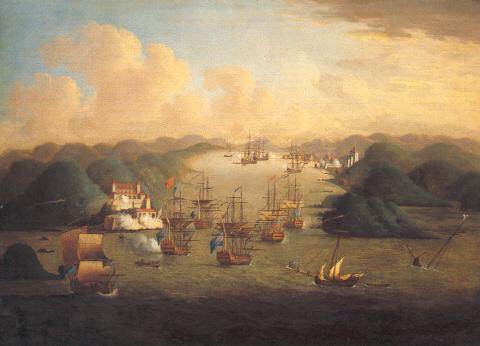Annotation:Portabello Hornpipe: Difference between revisions
No edit summary |
No edit summary |
||
| (5 intermediate revisions by the same user not shown) | |||
| Line 2: | Line 2: | ||
{{TuneAnnotation | {{TuneAnnotation | ||
|f_tune_annotation_title= https://tunearch.org/wiki/Annotation:Portabello_Hornpipe > | |f_tune_annotation_title= https://tunearch.org/wiki/Annotation:Portabello_Hornpipe > | ||
|f_annotation='''PORTABELLO HORNPIPE.''' AKA - "Portabellow Hornpipe," "Portobello." English, Hornpipe. G Major. Standard tuning (fiddle). AB: AABB. | |f_annotation='''PORTABELLO HORNPIPE.''' AKA - "Port Bello [2]," "Portabellow Hornpipe," "Portobello." AKA and see "[[Butcher's Hornpipe (1)]]," "[[Ridotta (The)]]." English, Hornpipe. G Major. Standard tuning (fiddle). AB: AABB. "Portobello Hornpipe" appears in the music manuscript collections of fiddlers William Irwin (c. 1850, Langdale, near Wigton, Lake District, Cumbria) and, in an earlier prototype as "Porto Bello", in Joseph Barnes (1762, Carlisle, Cumbria). Early versions of the tune were printed under the title "[[Ridotta (The)]]" in John Johnson's '''Choice Collection of 200 Favourite Country Dances vol. 2''' (London, after 1750, No. 1), a version that also appears in the music manuscript collection of Humphrey Senhouse (Cumbria, 1748). | ||
<br> | |||
<br> | |||
The title honors the English naval victory at the Battle of Porto Bello [https://en.wikipedia.org/wiki/Battle_of_Porto_Bello] (1739) against Spain during the War of Jenkin’s Ear (1739-1748), when Admiral Edward Vernon captured the Spanish town (now known as Portobelo in the modern-day Panama), an import harbor port on the Spanish Main. The victory was a sensation in England, and in 1740 when Vernon returned to London, he was feted with a dinner in his honor at which the song “[[God Save the King]]” was performed in public for the first time. [[File:portobello.jpg|650px|thumb|left|The Battle of Porto Bello]] As a consequence of Vernon's much-heralded victory, there are numerous place-names in Britain, Ireland and even North America with the name 'Portobello'. | |||
<br> | <br> | ||
<br> | <br> | ||
Nick Barber remarks the tune was popularized by the Cock and Bull Band in modern times. | Nick Barber remarks the tune was popularized by the Cock and Bull Band in modern times. | ||
|f_source_for_notated_version= | |f_source_for_notated_version=William Irwin's c. 1850 music manuscript collection (Lake District, Cumbria) [Offord]; Joseph Barnes c. 1762 music manuscript collection (Cumbria) [Offord]. | ||
|f_printed_sources=Barber ('''Nick Barber's English Choice'''), 2002; No. 71, p. 33 (as "Portobello"). Callaghan ('''Hardcore English'''), 2007; p. 22. Knowles ('''A Northern Lass'''), 1995; p. 39. | |f_printed_sources=Barber ('''Nick Barber's English Choice'''), 2002; No. 71, p. 33 (as "Portobello"). Callaghan ('''Hardcore English'''), 2007; p. 22. Knowles ('''A Northern Lass'''), 1995; p. 39. Offord ('''Bonny Cumberland'''), 2018; p. 53 (two versions). | ||
|f_recorded_sources=DMPCD 0204, Nick & Mary Barber with Huw Jones - "Lovely Nancy" (2002). FLP004CD, Florida – “Danse Macabre” (1999). Idlewild Recordings, David Spaulding Sharp - "Oaken Leaves" (2010). Topic 12TS421, Hemlock Cock and Bull Band - "All Buttoned Up" (1981). | |f_recorded_sources=DMPCD 0204, Nick & Mary Barber with Huw Jones - "Lovely Nancy" (2002). FLP004CD, Florida – “Danse Macabre” (1999). Idlewild Recordings, David Spaulding Sharp - "Oaken Leaves" (2010). Topic 12TS421, Hemlock Cock and Bull Band - "All Buttoned Up" (1981). | ||
|f_see_also_listing=Hear the tune played on whistle by David Spaulding Sharp on youtube.com [https://www.youtube.com/watch?v=YOs9oRR8bSg]<br> | |f_see_also_listing=Hear the tune played on whistle by David Spaulding Sharp on youtube.com [https://www.youtube.com/watch?v=YOs9oRR8bSg]<br> | ||
}} | }} | ||
------------- | ------------- | ||
Latest revision as of 21:57, 5 November 2023
X: 96 T:Portobellow Hp. WI.096 M:C| Q:180 S:Wm Irwin, Folio MS, c1850. AGG's Transcription R:Hornipe O:England A:Lake District Z:vmp.Chris Partington.2005 K:G DE/F/|G2GA G2B,E|DCB,A, G,A,B,G,|A,2AB A2GA|BABG EFGE|! G2GA G2B,E|DCB,A, G,2Bc|dBGB cAFA|G2GA G2:|! |:Bc|d2de d2ef|gfed e2ef|edcB cBAG|FGAF D2CB,|! C2EC B,2DB,|A,2CA, G,2Bc|dBGB cAFA|G2GA G2:|]
PORTABELLO HORNPIPE. AKA - "Port Bello [2]," "Portabellow Hornpipe," "Portobello." AKA and see "Butcher's Hornpipe (1)," "Ridotta (The)." English, Hornpipe. G Major. Standard tuning (fiddle). AB: AABB. "Portobello Hornpipe" appears in the music manuscript collections of fiddlers William Irwin (c. 1850, Langdale, near Wigton, Lake District, Cumbria) and, in an earlier prototype as "Porto Bello", in Joseph Barnes (1762, Carlisle, Cumbria). Early versions of the tune were printed under the title "Ridotta (The)" in John Johnson's Choice Collection of 200 Favourite Country Dances vol. 2 (London, after 1750, No. 1), a version that also appears in the music manuscript collection of Humphrey Senhouse (Cumbria, 1748).

Nick Barber remarks the tune was popularized by the Cock and Bull Band in modern times.

